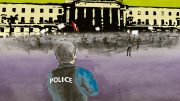The 2011 Manitoba provincial elections concluded last week, with the New Democrat Party of Manitoba securing 37 seats for their fourth consecutive majority government. As an undecided voter who cast a ballot for an NDP representative, I suppose I should be glad the party I chose to support won the overall election.
But there’s something disheartening about choosing between two very similar political platforms, with campaigns that feature attack ads intent on highlighting the negative aspects of their opponents, instead of promoting what positive change their own party plans to bring to the province.
Whether it was the NDP running television ads where they took a passing swipe at the (soon to be “former”) leader of the Opposition Hugh McFadyen’s wardrobe and trying to use the return of the Winnipeg Jets as a sign of political advantage, or the Progressive Conservatives’ attempt to pin every broken promises made over the past 12 years by a Doer-led government on Premier Greg Selinger — who has been sitting in the NDP driver’s seat for less than two years — both campaigns left me wondering who was supposed to be eating up this back and forth tripe.
These negative talking points surely worked wonders with each party’s committed supporters, but for rational undecided voters the mudslinging may have done more harm than good. I’m not so sure that democracy was created so the average citizen could choose between essentially three political options: “status quo” (the NDP), “change for the sake of change” (the PCs) and “might as well throw your vote away” (the Liberals, Greens or other independent parties).
I’m not sure there was a better example of just how weird this election was than the weak excuse of an endorsement that the traditionally right-wing oriented Winnipeg Sun offered for McFadyen and the PCs. The headline on the front page of the Oct. 3 issue read “Best of a bad lot”; their editorial column was entitled “Holding our nose for Hugh.” Simply glowing.
From the perspective of a young undecided voter, this election reinforced my belief that towing political lines is a pointless exercise. When I was young, bullheaded and foolhardy — eager to make my political voice heard — I was ready to commit myself to one political party for life; akin to my sports fanaticism, I was ready to be as vocal as possible about my chosen party’s political dominance and defend them to my last breath.
Unfortunately, growing up in Charleswood meant I was forced to accept the cold fact that my family lives in a long-standing Conservative stronghold, with a slim-to-nil chance of that status ever changing. Since the 1960s, the Conservatives have been decisively winning the riding in which I’ve spent the majority of my life. This left me with three options: hit the pavement and go door-to-door to drum up support for my party at the grassroots level; move to a different part of the city where my political voice may help to affect change; or simply give up on the thought of ever getting a representative that doesn’t pander to the major demographics — in Charleswood that’s predominantly (sometimes upper) middle class families and seniors.
Furthermore, not only was I residing in a predominantly Conservative riding, but I was literally straddling the line between two staunchly Conservative Winnipeg ridings; walking down my street on the days leading up to election night, signs for two different Conservative candidates dominated my neighbors front lawns. There is something disheartening about not only living in a riding considered to be a political stronghold, but essentially living in the heartland of one party’s political stronghold.
Despite being consistently reminded how important it is to vote in elections — as a citizen living in a free country — I just can’t shake the feeling that my vote doesn’t really matter. Doesn’t matter how many different elections I vote in, it seems like it’s set in stone Charleswood and the adjacent area of the city will always be home to a majority of Tory supporters, and will therefore always be shaded blue on the electoral map.
During my most rebellious phases, it felt like I was living in some sort of bizarre democracy-dictatorship hybrid. While everyone was still entitled to vote, without the possibility for occasional political change, what was the point in voting at all? For every election, I could stay at home and watch the election coverage, see the results in all the hotly contested ridings, and just pretend that I voted in my own.
“Oh look! The Tories won my riding again! What a surprise!”
But that would be down right immature. I will continue to vote for as long as I’m living in Charleswood — despite the futility of it all — because it’s still the best way for me to use our electoral system to show how I feel about the direction in which politicians are taking our city, province or country. Maybe one day I will be more optimistic about my political voice; until then, I will remain cast off in a deep sea of blue.




